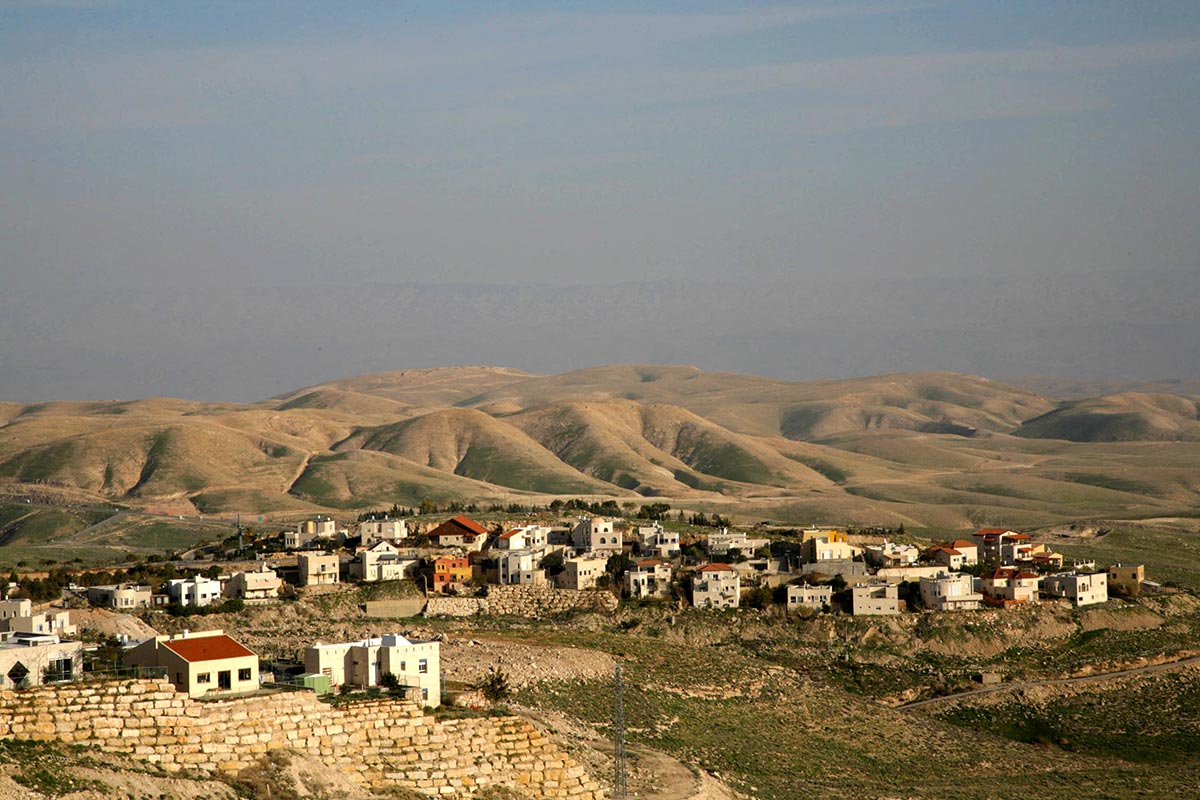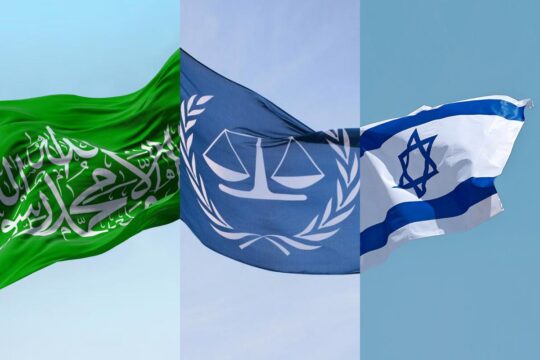“Nof Canaan” is renting out studios and apartments in Kfar Adumim. Photos show a kitchen, a room with beds and a small balcony, panoramic views of the Yehuda Desert, several hikers and a sunset. A free swimming pool is nearby. The accommodation is offered by travel company Booking on its platform as “a great location” in an “Israeli settlement” on “Palestinian territory.”
This lodging is one of the examples presented by a coalition of four European and Palestinian organizations – SOMO, The European Legal Support Center (ELSC), Al-Haq and The Rights Forum – that investigated Booking’s involvement in illegal settlements in Occupied Palestinian Territory (OPT). The large Israeli settlement Kfar Adumim, northeast of Jerusalem, was founded in 1979 on land “appropriated from the Palestinian village of Anata,” says the coalition. “Booking facilitates the rental of homes on land from which indigenous Palestinian communities were forcibly displaced.”
Jericho Inn in Vered Yeriho is also advertised on the Booking platform. The host of the property claims the “hostel is located in the territory of the State of Israel” and further states that “there is no entry to a Palestinian ID card” according to “security directives.” However, Vered Yeriho is an illegal Israeli settlement on confiscated Palestinian land in the West Bank.
The settlements started to be established in the occupied territories on Palestinian land after the 1967 Arab-Israeli war. The International Court of Justice (ICJ) concluded in 2004 that “the Israeli settlements in the Occupied Palestinian Territory (including East Jerusalem) have been established in breach of international law.” The transfer by the “occupying power of parts of its own civilian population into the territory it occupies,” which is a breach of the Fourth Geneva Convention, is also listed as a war crime in the Rome Statute of the International Criminal Court (ICC).
“Profiting from war crimes”
“Settlements are the result of multiple war crimes. Profiting from war crimes is illegal under Dutch criminal law,” the NGO coalition states. And late last year the four organizations filed a criminal complaint for money laundering against Booking, headquartered in The Netherlands, with the Dutch Public Prosecution Service. The case is made public today, 23 May 2024. “We assert that Booking.com is bringing proceeds of crime into the Dutch financial system, which makes them guilty of money laundering,” the complainants state. This is “the first case of its kind accusing a company of money laundering in connection to war crimes. With this legal action, we aim to end Booking.com’s involvement in international crimes in the OPT and to end the corporate impunity surrounding such violations,” they point out. “We are handing the Dutch prosecutor this case on a silver platter,” says SOMO’s researcher Lydia de Leeuw in the press file that was shared with Justice Info.
In a written reaction to Justice Info on May 23 Booking said: “We do not agree with these allegations of illegal activities and believe that we fully comply with the laws of the Dutch and American authorities [Booking Holdings is US-based], to which we are bound. There are no applicable laws that prohibit listing accommodations in Israeli settlements in the West Bank.”
The Dutch Public Prosecution Service commented that it will first study the case and then decide whether to open an investigation.
The complaint against Booking was filed after 7 October 2023, when Hamas militants and other armed Palestinian groups launched a gruesome attack on Israel, killing hundreds of civilians, military and police, molesting victims, destroying properties, and taking at least 245 hostages of whom some were subjected to rape and other sexual violence, according to the ICC prosecutor Karim Khan. Israel reacted with a full war and a siege on Gaza killing, starving, persecuting and exterminating civilians, alleged Khan. On 20 May he requested arrest warrants for Israeli Prime minister Benjamin Netanyahu and Defence minister Yoav Gallant, and three top Hamas leaders.
Palestinians in the West Bank are also attacked, detained, tortured and killed. Israeli settlers took the opportunity to further expand their control over occupied territories. “The settlements have worsened since 7 October, both by the Israeli army and by the settlers,” Habib Nassar, from Impunity Watch, told Justice Info.
The UN database on business involvement
The matter of businesses facilitating and operating in the illegal Israeli settlements has been on the international agenda for years. In 2012, the UN Independent International Fact-Finding Mission, which investigated the implications of these colonized areas on the rights of the Palestinians, looked into the issue of the responsibility of private companies. In its report the investigators stated that “business enterprises have, directly and indirectly, enabled, facilitated and profited from the construction and growth of the settlements.” They identified 10 different business activities that “raise particular human rights violations concerns,” ranging from the construction and the expansion of settlements, the wall and associated infrastructure; the supply of surveillance and identification equipment; the supply of equipment for the demolition of housing, property, agricultural farms, greenhouses, olive groves and crops; to the provision of services and utilities supporting the maintenance and existence of settlements.
Eight years ago, on 24 March 2016, the UN Human Rights Council (HRC) adopted resolution 31/36 which underlined that UN bodies (the Commission on Human Rights, the Human Rights Council, the Security Council and the General Assembly) affirmed “the illegality of the Israeli settlements in the occupied territories.” The HRC referred to the ICJ’s opinion and the Fourth Geneva Convention. To track business involvement, it also decided to create a database of all enterprises active in one – or more – of those ten activities in the Israeli settlements. The plan was to come out with a report every year.
However, it took the UN Office of the High Commissioner for Human Rights (OHCHR) four years before it released in February 2020 its report with a database listing 112 business entities. In July 2022, the OHCHR sent a letter to all these companies saying it was reviewing the database and invited them to inform the office whether they were still active in the illegal settlements. In total 15 business enterprises were removed from the list because they were ceasing or no longer involved in the listed activities. Mostly these were Israeli companies, as well as General Mills from the United States and Indorama Ventures PCL from Thailand. Human Rights Watch (HRW), a US-based international NGO, would however note “that some companies may have adjusted their business structures to avoid falling within the definition of reportable activity.”
The UN under pressure
Finally, OHCHR published on 30 June 2023 the updated database, explaining the absence of annual reporting was caused by a lack of regular budget. HRW welcomed the report, but stated: “Had the mandate been properly implemented, this year would have seen the seventh substantive report of the database, not its second.”
The UN body was “faced by political constraints, which are continuing. Certain countries are obstructing the ongoing development of the list,” explains Tara Van Ho, senior lecturer at the School of Law and Human Rights Centre, University of Essex. “One of the claims was that the database was antisemitic. There is some truth in it. The database is focusing on Israel, while there is no such list for instance for Russia. Yet, I don’t see the kind of settlement and annexation, that we observe in the West Bank, being as present in other countries,” says Van Ho, who lived a few months in Ramallah, in the West Bank, when she worked for a Palestinian organization in 2015.
HRW noted a “highly pressurized environment, in which certain states have demonstrated hostility to the implementation of the mandate.” This “served to shield Israel” and businesses “from their international legal responsibilities,” the NGO stated. The “chronic under-implementation” of the mandate is “damaging to the integrity and credibility of both the Office of the High Commissioner and the Human Rights Council. It is unacceptable, and sets a dangerous precedent, that a mandate of the Council is largely ignored, especially over such an extended period,” HRW said.
Booking’s responses to the UN list
The new UN-database lists 97 companies. The vast majority, 81, are Israeli businesses. The other 16 are Western companies from the US (5), The Netherlands (3), France (3), UK (3), Luxembourg (1) and Spain (1). The OHCHR writes that the present list “does not purport to constitute a judicial or quasi-judicial process of any kind, or to provide any legal characterization of the listed activities or business enterprises’ involvement therein.” This paragraph is added to underline that as such the list has no legal power. “It’s not a criminal complaint or any other judicial procedure,” Van Ho says.
On the UN-list feature four prominent travel companies: Booking (The Netherlands/US), Airbnb (US), Expedia (US) and Tripadvisor (US). Justice Info contacted all four travel companies for a reaction to their presence on the list. Only Booking responded to our questions.
A spokesperson of Booking explained in an emailed reaction that the company facilitates accommodations worldwide on its platform, including conflict regions. Its policy is to allow all providers to advertise their accommodation on the platform “as long as they obey the relevant local law,” the company says. “Our mission at Booking is to make it easier for everybody to experience the world and therefore we believe it’s up to the travelers themselves to decide where they want and have to go.” Booking claims that when it receives a warning that an accommodation is possibly linked to human rights violations, “we look at this immediately and take, if necessary, appropriate action” in accordance with the company’s “Human Rights Statement.”The company didn’t answer the question whether it was violating the law.
Booking says that “the war in Gaza and the increasing violence on the West Bank are heartbreaking.” The company states that it is “sad because of the extreme pain, the suffering and the losses so many people in the region are suffering.” It adds: “our thoughts” are with all those affected. “We sincerely hope an end to the violence.”

“It’s so disconnected from reality”
On their platforms the four travel companies show the beauty of the accommodations in the settlements and its surroundings. “These enterprises play quite an important role. They help normalize the settlements for foreigners. It is almost propaganda,” Van Ho says. When tourists visit the settlements they stay in nice places which have electricity, water and other services. “They don’t experience how Palestinians in their villages, towns and cities nearby, are denied these basic facilities. They don’t experience the Israeli militarization of the Palestinian enclaves. They don’t witness the humiliations, degradation, the increased monitoring, killings and torture that Palestinians face. Tourists are missing out this reality. The settlements are themselves a war crime and they are linked to other crimes committed against Palestinians. Tourists don’t see how they themselves contribute to a war crime,” she continues. When she lived in the West Bank she had friends who went on a trip along the settlements. “It’s so disconnected from reality. It’s so different from my experiences when I was taking a Palestinian taxi. They weren’t stopped, as I was, at military checkpoints and passport checks.”
This reality is absent on the platforms of the travel companies. On Tripadvisor the Metzoke Dragot Hostel is described as being in Israel “located on a cliff 20 metres above sea level, boasting splendid views of the desert mountains and the Dead Sea.” Tripadvisor fails to disclose the true nature of the place. Two guests, Sarah and Robert from Oxford, were shocked to find out they booked a room in an Israeli settlement “therefore illegal under international law,” they wrote in a review in 2019. “It has huge fences around it and very much feels like a settlement. We were not at all happy to find this out and they really should make this clear on their website.”
Booking only briefly mentions that “Top of the cliff apartments” is located in the Israeli settlement Metzoke Dragot in Palestinian territory, warning it’s not possible to book the place on its platform and referring tourists to Tranquilo – Dead Sea Glamping in nearby ex-Kibbutz Mitzpe Shalem, which is on land belonging to the Palestinian Bedouin village of Ayn Trayba, and other settlements such as Ovnat further north. Airbnb offers accommodations in Ovnat as well, claiming these are located in Israel, failing to mention this is an illegal settlement. Expedia advertises Nof Canaan as a “comfortable guesthouse in Nofei Prat with free parking” and only mentions in the address that this is an Israeli settlement.
A case against Airbnb
The West Bank is an important factor for tourists to choose Israel as a destination. The Israeli government developed programs “aimed at enriching the tourism industry within Israeli settlements” by providing assistance in setting up and maintaining hotels and accommodations, law student Mila Kelly wrote in 2021 in an article in William and Mary Business Law Review. Meanwhile Israel places “strict limitations on access to the settlements.” Not for tourists and Israeli citizens, but for Palestinian residents of the West Bank who “are excluded from entering the settlements for the purpose of property rental,” Kelly stated. Precisely what Jericho Inn writes in its profile on Booking’s platform where it says there’s no entry with a Palestinian ID. Tourism activities in the West Bank “have led directly to the expansion of settlements,” Kelly wrote. She argued that companies see the settlements as “a viable source of business” and are “willing to risk potential repercussions of international corporate liability for the pursuit of financial gains.”
“Under international law all businesses should respect human rights. Regardless of their industry, size, ownership structure, or operational context. They are required to assess whether their operations have a negative impact on human rights,” says Van Ho, referring to the United Nations Guiding Principles on Business and Human Rights. She has no doubt that the four travel companies, like the other companies on the UN list, all contribute to human rights violations. “Legal enforcement is left to the domestic regulators. But what we see is that European and US authorities don’t act in the case of human rights violations against Palestinians. Palestine is the exception in many Western states,” claims Van Ho. She concludes: “These four travel companies, like the other enterprises, should be investigated and the leadership should be charged with complicity in war crimes where the evidence supports this.”
In its written reaction to Justice Info on May 23, Booking states that it is restricted to take action in the US as there are “many American state laws that limit our ability to withdraw from the region. For example, 38 US states have measures discouraging boycotts or divestments from Israel, with some states explicitly prohibiting boycotts or divestments from the country or its occupied territories. Legal action has been taken against other companies that have attempted to withdraw their activities and we expect this will be the case for us as well.”
In her 2021 article Kelly described a case against Airbnb, explaining that the travel company was facing criticism “from the international community” that it was “profiting from illegal activity which is boosting settlement economies allowing for the furtherance of their development and maintenance” and “fostering discrimination against Palestinians who are unable to rent or list in these areas.” In November 2018, Airbnb announced it was going to ban the listing of properties in the illegal settlements. Soon, however, Airbnb would change its mind. In Israel lawyers launched a class action lawsuit accusing Airbnb of “outrageous discrimination” as the delisting was “directed solely against Israeli citizens living in the settlement” and demanded compensation. Eleven Israeli settlers (U.S. citizens) who listed or planned to advertise their properties in settlements on Airbnb, as well as nine U.S. citizens who searched for such rentals, filed a complaint against Airbnb in the Delaware federal court. The plaintiffs referred to the Fair Housing Act (FHA) and argued that delisting illegal settlement properties discriminated against Jews and Israelis on “the basis of race, religion and national origin.” These legal actions were settled, Kelly wrote. In April 2019 Airbnb decided to stop the planned delisting of Israeli settlements in the occupied West Bank. The company said it would donate the money it made from bookings in the territory to international humanitarian aid organizations. “I think Airbnb should have challenged the case based on the law, saying they don’t want to be complicit in international crimes,” says Van Ho. Meanwhile companies have continued their activities. “They want to make money, choose to facilitate settlements, actively engage in crime but don’t face the consequences for criminal complicity,” alleges Van Ho.
What about institutional investors?
Van Ho thinks the problem stretches beyond these companies. “There is a large structure with mother companies and institutional investors behind it,” she says. Last year a coalition of 25 Palestinian and European organisations highlighted these ties. In a report called “Don’t Buy into Occupation” the organizations stated that 776 European financial institutions – banks, insurance companies, and pension funds – had financial relationships with 51 businesses, including the four travel companies, that are actively involved with Israeli settlements. “These financial institutions should make the decision to comply with their obligations,” says Van Ho. In 2019 she investigated with two colleagues the Norwegian Statens Pensjonsfund Utland (SPU). The team concluded that this government pension fund was “directly linked to a wide variety of adverse human rights impacts” in the Occupied Palestinian Territory.
Van Ho points at the severe consequences of this reality. “Israel and Palestine would not be in these circumstances today if states had taken their responsibility with respect to these companies, which are facilitating the ongoing conflict. If governments had really engaged, Israel would have responded and changed its policy. There is now a war with Israel and Hamas both committing international crimes. The conflict spiraled out of control partly because states and businesses didn’t take their responsibility to stop fueling the settlements,” she claims.
Now all eyes are on the case brought and made public by the coalition against Booking, to see how the Dutch prosecutors will handle the money laundering case against the company in connection to war crimes. “For decades, foreign companies have contributed to and benefited from atrocities perpetrated in the occupied Palestinian territory, with full impunity,” the coalition says. “Third States have an obligation to end dealings with Israel’s illicit settlement economy.”







